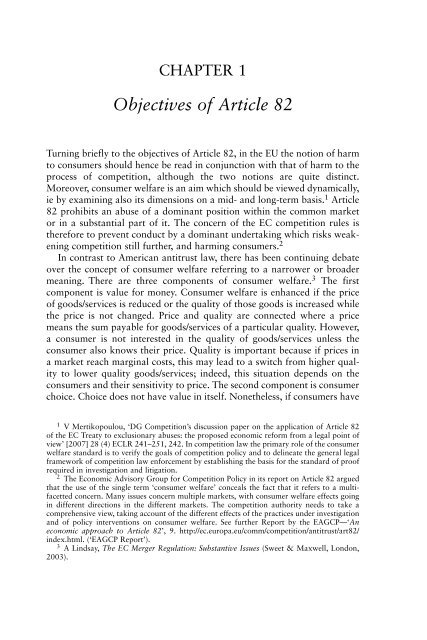Abuse of Economic Dependence - The Centre for European Policy ...
Abuse of Economic Dependence - The Centre for European Policy ...
Abuse of Economic Dependence - The Centre for European Policy ...
Create successful ePaper yourself
Turn your PDF publications into a flip-book with our unique Google optimized e-Paper software.
CHAPTER 1<br />
Objectives <strong>of</strong> Article 82<br />
Turning briefly to the objectives <strong>of</strong> Article 82, in the EU the notion <strong>of</strong> harm<br />
to consumers should hence be read in conjunction with that <strong>of</strong> harm to the<br />
process <strong>of</strong> competition, although the two notions are quite distinct.<br />
Moreover, consumer welfare is an aim which should be viewed dynamically,<br />
ie by examining also its dimensions on a mid- and long-term basis. 1 Article<br />
82 prohibits an abuse <strong>of</strong> a dominant position within the common market<br />
or in a substantial part <strong>of</strong> it. <strong>The</strong> concern <strong>of</strong> the EC competition rules is<br />
there<strong>for</strong>e to prevent conduct by a dominant undertaking which risks weakening<br />
competition still further, and harming consumers. 2<br />
In contrast to American antitrust law, there has been continuing debate<br />
over the concept <strong>of</strong> consumer welfare referring to a narrower or broader<br />
meaning. <strong>The</strong>re are three components <strong>of</strong> consumer welfare. 3 <strong>The</strong> first<br />
component is value <strong>for</strong> money. Consumer welfare is enhanced if the price<br />
<strong>of</strong> goods/services is reduced or the quality <strong>of</strong> those goods is increased while<br />
the price is not changed. Price and quality are connected where a price<br />
means the sum payable <strong>for</strong> goods/services <strong>of</strong> a particular quality. However,<br />
a consumer is not interested in the quality <strong>of</strong> goods/services unless the<br />
consumer also knows their price. Quality is important because if prices in<br />
a market reach marginal costs, this may lead to a switch from higher quality<br />
to lower quality goods/services; indeed, this situation depends on the<br />
consumers and their sensitivity to price. <strong>The</strong> second component is consumer<br />
choice. Choice does not have value in itself. Nonetheless, if consumers have<br />
1 V Mertikopoulou, ‘DG Competition’s discussion paper on the application <strong>of</strong> Article 82<br />
<strong>of</strong> the EC Treaty to exclusionary abuses: the proposed economic re<strong>for</strong>m from a legal point <strong>of</strong><br />
view’ [2007] 28 (4) ECLR 241–251, 242. In competition law the primary role <strong>of</strong> the consumer<br />
welfare standard is to verify the goals <strong>of</strong> competition policy and to delineate the general legal<br />
framework <strong>of</strong> competition law en<strong>for</strong>cement by establishing the basis <strong>for</strong> the standard <strong>of</strong> pro<strong>of</strong><br />
required in investigation and litigation.<br />
2 <strong>The</strong> <strong>Economic</strong> Advisory Group <strong>for</strong> Competition <strong>Policy</strong> in its report on Article 82 argued<br />
that the use <strong>of</strong> the single term ‘consumer welfare’ conceals the fact that it refers to a multifacetted<br />
concern. Many issues concern multiple markets, with consumer welfare effects going<br />
in different directions in the different markets. <strong>The</strong> competition authority needs to take a<br />
comprehensive view, taking account <strong>of</strong> the different effects <strong>of</strong> the practices under investigation<br />
and <strong>of</strong> policy interventions on consumer welfare. See further Report by the EAGCP—‘An<br />
economic approach to Article 82’, 9. http://ec.europa.eu/comm/competition/antitrust/art82/<br />
index.html. (‘EAGCP Report’).<br />
3 A Lindsay, <strong>The</strong> EC Merger Regulation: Substantive Issues (Sweet & Maxwell, London,<br />
2003).


